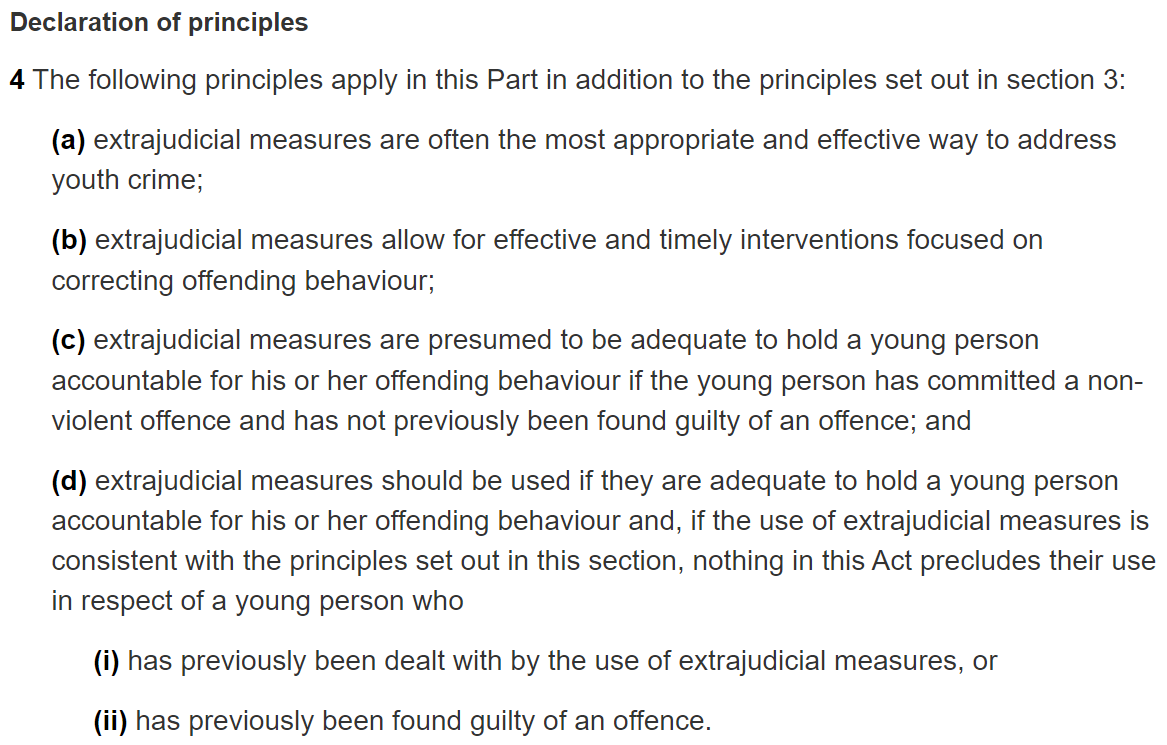What Are Youth Extrajudicial Measures and Sanctions?
The Youth Criminal Justice Act (the “Act”) has special provisions that allow the police and Crown to address certain matters without using the formal youth criminal court system, known as extrajudicial measures.
Extrajudicial measures were created with the intention of holding youth accountable, while encouraging them to repair any harm caused to the victim or community. Since their introduction via the Act in 2010, only 42% of accused youth have been formally charged, down from 63% in 1999. For a wider look at trends, view our updated Canada crime rates and statistics.
Examples of extrajudicial measures include:
- Police Warnings: An informal measure exercised at the discretion of the police.
- Take No Further Action: In this case, the police have decided that sufficient steps have been taken by someone else (such as the youth’s parents) to hold the youth accountable.
- Crown Cautions: Occurs when police refer the case to the Crown, and the Crown, in turn, writes a letter to the youth and/or their parents.Referrals to Community Programs: With the youth’s consent, the youth may be referred to a community agency with the goal of preventing them from committing more offences in the future. Some youth matters also intersect with education and attendance issues; see our overview of truancy laws in Canada.
In more serious cases, an extrajudicial sanction may be used. Extrajudicial sanctions are a form of extrajudicial measure that comes with a more formal set of rules for the young person involved.
Much like the Adult Alternative Measures Program, youth extrajudicial sanctions provide young offenders a way to accept responsibility for the offence, without being found guilty or receiving a criminal record.
The program is designed specifically for young offenders (person’s accused of an offence who are under 18 years of age). Once the extrajudicial sanctions required have been completed, charges will be withdrawn. This is distinct from a stay of proceedings in criminal trials, which temporarily halts a case rather than resolving it.
Examples of extrajudicial sanctions include:
- Counselling;
- Compensating and/or apologizing to the victim;
- Doing community service or volunteer work for a non-profit agency; and
- Writing an essay about their behaviour or the harm they caused.
It is important to note that where extrajudicial sanctions are used, a timeline will be provided as to when they need to be completed (typically 3-4 months).
If you do not complete the extrajudicial sanctions and are not granted an extension, the Crown will proceed with charges against you.
How to Accept Responsibility for Your Actions Without Getting a Criminal Record
Like the Adult Alternative Measures Program, extrajudicial measures and sanctions are only available to youth who accept responsibility for the offence. Relatedly, section 10(3)(a) of the Act bars the use of extrajudicial sanctions in situations where the youth denies participation or involvement in the commission of the offence:

Below is an example of a youth extrajudicial sanctions referral form*, on which the youth must accept responsibility for the offence:
Please note that the use of forms varies by province. For specific information on youth extrajudicial measures and sanctions in your area, please select the location nearest you and select “Court Processes” followed by “Resolutions” and click “Youth Extra Judicial Sanctions.”
Alternatively, please contact one of our dedicated defence lawyers to discuss potential youth diversion programs in your area.
Who is Eligible for Youth Extrajudicial Measures or Sanctions?
Typically, Crown Prosecutors will have more latitude to divert matters into the Extra Judicial Sanctions Program because the main goal in dealing with young offenders is rehabilitation, rather than punishment.
In fact, Section 4(a) of the Act specifies that extrajudicial measures are often the most appropriate and effective way to address youth crime.
The likelihood of diverting a charge outside of the formal criminal justice system will depend on the circumstances of the offence, and the accused.
For example, section 4(b) of the Act specifies that extrajudicial measures are presumed to be adequate in the case of non-violent offences.
Moreover, having been previously found guilty of an offence is not reason alone to exclude a youth offender from this program as per section 4(d) of the Act:

Whereas extrajudicial measures are used as an alternative to laying formal charges, specifically when the circumstances of the offence are less serious, extrajudicial sanctions entail more formal conditions.
They are used where the Crown does not believe an extrajudicial measure would hold the youth accountable.
Per section 10(2) of the Act, extrajudicial sanctions may only be used when:
- The program has been approved by the government;
- The youth has been advised of their right to a lawyer and had a reasonable time to consult with one;
- It appropriately addresses the youth’s needs and societal interests;
- The youth freely agrees to participating;
- The youth accepts responsibility for their actions;
- There is enough evidence that the youth committed the crime to proceed with criminal proceedings; and
- Prosecution of the crime is allowed by law.
What’s Next?
Legal advice is critical to ensure you have the best chance of being considered for extrajudicial measures or sanctions. While the discretion for these remedies ultimately lies with the Crown, at Strategic Criminal Defence we are committed to effectively negotiating on your behalf to sway the prosecutor and obtain the desired result.
If you have any questions or need assistance, do not hesitate to contact us and one of our lawyers will be in touch as soon as possible to guide you through the next steps.








